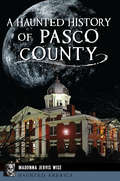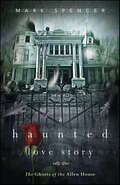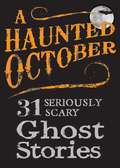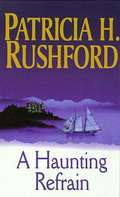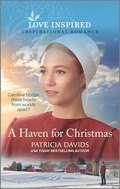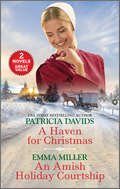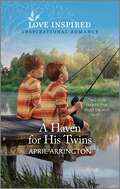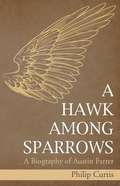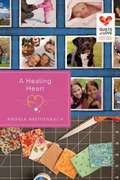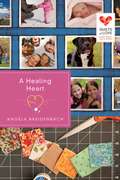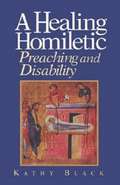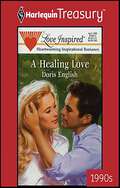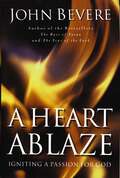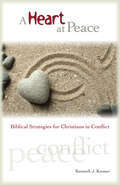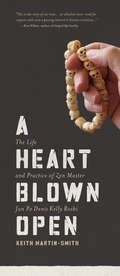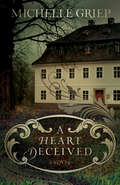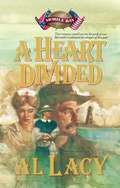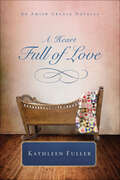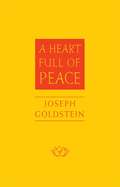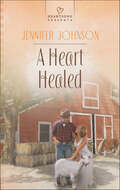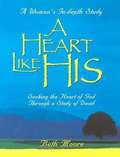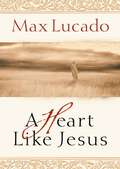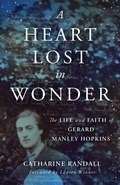- Table View
- List View
A Haunted History of Pasco County (Haunted America)
by Madonna Jervis WiseIn a land occupied for thousands of years, mystery and unrest linger. Anguished soldierly figures dot the landscape of Pasco County, from the doomed march of Major Dade and his haunted hill to the ghost of Captain Jeffries standing watch over his homestead in Zephyrhills. A pair of spirits drifts about near a Dade City pond, perhaps the brother and sister cut down during the infamous Bradley Massacre. Echoes of the once rugged frontier rebound from the Ellis-Gillett feud, vigilantism and Sheriff Bart's justice. Obliterating the mounds of indigenous people cast an ever-present and ominous tone over sacred grounds throughout the county. Author Madonna Wise shares ethereal accounts of the Meighan Theatre, the treacherous Road to Nowhere, the Edwinola Hotel and more.
A Haunted Love Story: The Ghosts of the Allen House
by Mark SpencerWhen Mark Spencer and his family moved into the beautiful old Allen House in Monticello, Arkansas, they were aware of its notorious reputation for being haunted. According to local lore, the troubled spirit of society belle Ladell Allen, who had mysteriously committed suicide in the master bedroom in 1948, still roamed the grand historic mansion. Yet, Mark remained skeptical—until he and his family began encountering faceless phantoms, a doppelganger spirit, and other paranormal phenomena. Ensuing ghost investigations offered convincing evidence that six spirits, including Ladell, inhabited their home. But the most shocking event occurred the day Mark followed a strange urge to explore the attic and found, crammed under a floorboard, secret love letters that touchingly depict Ladell Allen's forbidden, heart-searing romance—and shed light on her tragic end.This haunting true ghost story includes several photographs of the Allen House.
A Haunted October
by Editors of Adams MediaThirty-one days, thirty-one chilling stories to scare you all the way to Halloween. On each day leading up to All Hallows' Eve, you'll be introduced to a frightening poltergeist. A Haunted October provides a month's worth of terrifying tales that'll haunt you for years to come.
A Haunted October: 31 Seriously Scary Ghost Stories
by Media AdamsThirty-one days, thirty-one chilling stories to scare you all the way to Halloween. On each day leading up to All Hallows’ Eve, you’ll be introduced to a frightening poltergeist. A Haunted October provides a month’s worth of terrifying tales that’ll haunt you for years to come.
A Haunting Refrain (Helen Bradley Mysteries, #3)
by Patricia H. RushfordEager to spend time with her husband while they remodel their home, Helen Bradley is reluctant to answer the summons of her eccentric uncle Paddy until she learns that there have been attempts on his life. Helen arrives at Paradise Island determined to protect her uncle, but fears abound. Never before in her years as a cop has Helen faced a ghost as a possible suspect. Now she must find the courage to confront her own beliefs - and to reveal whatever truth surfaces...
A Haven for Christmas (North Country Amish #3)
by Patricia DavidsCan love bridge these hearts from worlds apart?An Amish widow. An Englisch cowboy.And a Christmas to remember.An accident landing an Englischer on Becca Beachy’s farm isn’t quite the peaceful Christmas she expected. But with the widow struggling after an emergency, Tully Lange’s help is a blessing. Now Becca’s determined to give the cowboy a true Amish Christmas. But even as she falls for him, she knows their love is forbidden. Will this be the start of forever or the beginning of goodbye?USA TODAY Bestselling Author Patricia DavidsFrom Harlequin Love Inspired: Uplifting stories of faith, forgiveness and hope.North Country AmishBook 1: Shelter from the StormBook 2: The Amish Teacher’s DilemmaBook 3: A Haven for Christmas
A Haven for Christmas and An Amish Holiday Courtship
by Patricia Davids Emma MillerA Christmas to rememberA Haven for Christmas by Patricia DavidsAn accident landing an Englischer on Becca Beachy&’s farm isn&’t quite the peaceful Christmas she expected. But with the widow struggling after an emergency, Tully Lange&’s help is a blessing. Now Becca&’s determined to give the cowboy a true Amish Christmas. But even as she falls for him, she knows their love is forbidden. Will this be the start of forever or the beginning of goodbye?An Amish Holiday Courtship by Emma MillerGinger Stutzman has her sights set on the new Amish bachelor in town, but becoming a nanny for widower Eli Kutz&’s children puts her romance plans on hold. Though it&’s not the Christmas connection she expected, Ginger can&’t deny the pull she feels toward Eli. But is it only the shine of the holiday season—or is a family with Eli a gift built to last?USA TODAY Bestselling Author Patricia Davids
A Haven for His Twins: An Uplifting Inspirational Romance
by April ArringtonCan a former bull rider Prove he&’s father material? Seven years ago, former bull rider Holt Williams left his twin sons in the arms of a beautiful stranger. Jessie Alden has raised them as her own ever since, but now Holt is back and determined to be a dad to his boys. For his dream of fatherhood to come true, he must prove he&’s really changed. What will it take to convince Jessie he&’s the good man she and the twins deserve?From Love Inspired: Uplifting stories of faith, forgiveness and hope.
A Hawk Among Sparrows: A Biography Of Austin Farrer
by Philip CurtisThis biography of Austin Farrer, written with the cooperation of the trustees of the Farrer estate, presents a lively portrait of the man and his life and assesses his contribution as philosopher, biblical scholar, and divine. As Fellow and Chaplain of Trinity College, Oxford, and later Warden of Keble College, Oxford, Farrer broke new ground with his unorthodox approach to biblical criticism and won honor as a philosopher of religion with such works as Finite and Infinite. This biography includes extensive correspondence between Farrer and his father, a Baptist minister and theological college lecturer. These letters vividly illustrate Farrer's cast of mind and distinctive views while demonstrating the integrity and creativity of his relationships with family and friends.
A Healing Heart
by Angela BreidenbachMara Keegan is an uber-successful mother and a widow of three years. She's been chasing success and all the "good things in life" for her family to make up for the cruel whim God played on them by taking her husband. In an effort to be the perfect mom, she decides to make a photo memory quilt, a graduation present for her daughter, Cadence. She's not yet finished when she experiences a heart attack. While Mara recuperates, she revisits the choices she's made that led to this physically and spiritually broken heart. The memory quilt must be finished in time for Cadence's big day, but Mara struggles with her burgeoning feelings for the man who must keep Mara's business going during her recovery, Joel Ryan. Can Joel find his way into Mara's heart and onto Cadence's quilt?
A Healing Heart
by Angela BreidenbachMara Keegan is an uber-successful mother and a widow of three years. She's been chasing success and all the "good things in life" for her family to make up for the cruel whim God played on them by taking her husband. In an effort to be the perfect mom, she decides to make a photo memory quilt, a graduation present for her daughter, Cadence. She's not yet finished when she experiences a heart attack. While Mara recuperates, she revisits the choices she's made that led to this physically and spiritually broken heart. The memory quilt must be finished in time for Cadence's big day, but Mara struggles with her burgeoning feelings for the man who must keep Mara's business going during her recovery, Joel Ryan. Can Joel find his way into Mara's heart and onto Cadence's quilt?
A Healing Homiletic: Preaching and Disability
by Kathy BlackIn A Healing Homiletic: Preaching and Disability, Kathy Black offers a unique and effective approach for preaching about disabilities. By going to the heart of the gospel and drawing on the healing narratives or miracle stories, Black shows how preaching affects the inclusion or exclusion of forty-three million persons with disabilities from our faith communities. A Healing Homiletic provides a new method of preaching about healing, based on Scripture, for understanding the needs of the disability community.
A Healing Love
by Doris EnglishA MAN WITHOUT A PAST...When Brad Jeremiah's private plane crashed on a foggy hillside, Dr. Laura McBride risked her life to save him. And with Laura at his hospital bed, Brad woke to find he'd lost his memory. Discovering the handsome surgeon's identity was simple, yet his past remained a puzzling mystery....Did their love have a future?The healing touch of his beautiful doctor gave Brad hope and her faith gave him strength. Soon he imagined working beside her in the small mountain hospital. But as Brad prayed for help to uncover the secrets of his past, he feared the truth would destroy Laura's love, and their dreams of a life together....
A Heart Ablaze: Igniting a Passion for God
by John BevereGod delivered Israel from Egyptian bondage to captivate them for Himself. In the arid wilderness He planned to reveal His nature and ways to them, but they drew back. How different are we today? Many confess the Lordship of Jesus and acknowledge His saving power, yet like Israel, they've drawn back. Rather than pursuing His heart they have cleaved to this world's form of worship-the worship of self. As a result we have changed the image of Jesus to be like us. Fire can alter these images. The fire we need is found in the Holiness of God. God is calling us to draw nearer still...to tremble on Mt. Zion...transformed to touch others.
A Heart At Peace: Biblical Strategies for Christians in Conflict
by Kenneth J KremerLooking for biblical strategies to resolve conflict?Conflict and disagreements happen in all circles of society—regardless of race, religion, or creed. However, Christians are specifically called by God to reconcile with their neighbor in a Christlike fashion.That isn’t always easy to do. Resolving conflict is hard work.This book teaches you God’s method for conflict resolution as given in his Word. It will help you break down the hostility that can divide believers, while also aiding in the reconciliation process.Discover the spiritual relief that comes naturally when your heart is at peace!
A Heart Blown Open
by Keith Martin-SmithA Heart Blown Open chronicles the extraordinary journey of Zen master Jun Po Denis Kelly Roshi, whose life landed him in prison long before he landed in a monastery. Experience the successes and failures that led him to found an entirely new form of Buddhism called Mondo Zen. Starting from an abusive and alcoholic home in Wisconsin, Kelly becomes a major force in the counterculture of the 1960s and one of its biggest manufacturers of LSD. He ends up on the run for five years before serving time in a federal prison, and then goes on to spend six years in a Zen monastery. In his fiftieth year, he becomes a recognized Zen master in his own right, but the real journey is just about to begin. Extraordinary in their playfulness, depravity, and liberating insight, Jun Po's life events swirl together to underscore and illuminate the environment from which one of the most controversial masters of the American Zen scene has emerged. A Heart Blown Open constitutes a powerful synthesis of Eastern contemplative wisdom and Western psychological insight and is as entertaining as it is inspirational.Winner of the 2013 Silver Award for Excellence from Nautilus Book Awards.
A Heart Deceived
by Michelle GriepMiri Brayden teeters on a razor's edge between placating and enraging her brother, whom she depends upon for support. Yet if his anger is unleashed, so is his madness. Miri must keep his descent into lunacy a secret, or he'll be committed to an asylum--and she'll be sent to the poorhouse. Ethan Goodwin has been on the run all of his life--from family, from the law ... from God. After a heart-changing encounter with the gritty Reverend John Newton, Ethan would like nothing more than to become a man of integrity--an impossible feat for an opium addict charged with murder. When Ethan shows up on Miri's doorstep, her balancing act falls to pieces. Both Ethan and Miri are caught in a web of lies and deceit--fallacies that land Ethan in prison and Miri in the asylum with her brother. Only the truth will set them free.
A Heart Divided (Battles of Destiny Series #2)
by Al LacyWounded in the Civil War, Captain McGraw is caught between two loves -- an army nurse and the wife who abandoned him and now wants him back. A thrilling tale of love and the deadly forces of war.
A Heart Full of Love: An Amish Cradle Novella (Amish Cradle Novellas)
by Kathleen FullerEllie&’s mother hasn&’t stopped meddling in her personal life since Ellie lost her sight—and she&’s taken it up a notch now that Ellie&’s pregnant. When Ellie gives birth to twins, her mother insists on moving in to care for them. But when her mother&’s behavior becomes unbearable, Ellie is forced to take a stand . . . and finally find out why Mamm can&’t let go.
A Heart Full of Peace
by His Holiness the Dalai Lama Joseph GoldsteinLove, compassion, and peace - these words are at the heart of all spiritual endeavors. Although we intuitively resonate with their meaning and value, for most of us, the challenge is how to embody what we know: how to transform these words into a vibrant, living practice. In these times of conflict and uncertainty, this transformation is far more than an abstract ideal; it is an urgent necessity. Peace in the world begins with us. This wonderfully appealing offering from one the most trusted elders of Buddhism in the West is a warm and engaging exploration of the ways we can cultivate and manifest peace as wise and skillful action in the world. This charming book is illuminated throughout with lively, joyous, and sometimes even funny citations from a host of contemporary and ancient sources - from the poetry of W.S. Merwin and Galway Kinnell to the haiku of Issa and the great poet-monk Ryokan, from the luminous aspirations of Saint Francis of Assisi to the sage advice of Thich Nhat Hanh and the Dalai Lama.
A Heart Healed
by Jennifer JohnsonDoes Callie have a second chance at love?Callie Dawson has spent the past five years caring for her terminally ill parents and working as a hospice nurse, and now her small-town roots have called her home to Tennessee. Used to healing others, she needs to make peace with God...and start over. But first she has to face the past. A terrible misunderstanding separated her from Kirk Jacobs, the rancher she once loved with all her heart. Is this her chance to make things right?Kirk can't believe Callie's back-working at his family's B and B and rekindling powerful feelings. The rancher knows he should take things slowly, but his heart tells him something else.... And when a devastating diagnosis threatens their newfound bond, Kirk has to show Callie that he'll always be there for her. Because he can't lose her a second time.
A Heart Like His: Seeking the Heart of God Through a Study of David
by Beth MooreA Heart Like His: Seeking the Heart of God Through a Study of David - Member Book by Beth Moore provides a personal study experience five days a week plus viewer guides for the group video sessions of this in-depth women's Bible study. In this study of David and - the man the Bible calls a "man after God's own heart" and - Beth explores the pastures, caves, and palace of one of the most well known figures in history. David will make you laugh and cry. He will delight and disappoint you. He will make you want to be just like him at times and nothing like him at others. He is sure to capture your interest if you let him. And God is sure to change your heart and mdash if you let Him.<P><P> Beth Moore invites you to join her on an exciting and intimate journey to know King David focusing on his years as God's chosen king of Israel. David's life clearly demonstrates that God is always able to reach us, correct us, and reclaim our worship. If you've ever experienced doubts, temptations, losses, personal inconsistencies, or if you've anguished over family problems, then this study is for you.<P> The Member Book includes:<P> * 10 weeks of personal interactive study for five days a week<P> * Leader guide in back of book<P> * Viewer guide for use with the DVD teaching sessions
A Heart Like Jesus
by Max LucadoThe heart of Jesus is sacred, and the lessons and examples it provides to us are paramount in our daily mission to follow in His footsteps. Max Lucado poses the question "what if, for one day and night, your heart was replaced by the heart of Christ?" That thought-provoking question leads to many personal revelations demonstrating that we can recast our hearts to be more like that of Jesus, and the blessings created by the transformation will unleash ripples to the widest edges of our lives and those around us.
A Heart Lost in Wonder: The Life and Faith of Gerard Manley Hopkins (Library of Religious Biography (LRB))
by Catharine RandallGerard Manley Hopkins, one of the most beloved English-language poets of all time, lived a life charged with religious drama and vision. The product of a High-Church Anglican family, Hopkins eventually converted to Roman Catholicism and became a priest—after which he stopped writing poetry for many years and became completely estranged from his Protestant family.A Heart Lost in Wonder provides perspective on the life and work of Gerard Manley Hopkins through both religious and literary interpretation. Catharine Randall tells the story of Hopkins&’s intense, charged, and troubled life, and along the way shows readers the riches of religious insight he packed into his poetry. By exploring the poet&’s inner life and the Victorian world in which he lived, Randall helps readers to understand better the context and vision of his astonishing and enduring work.
